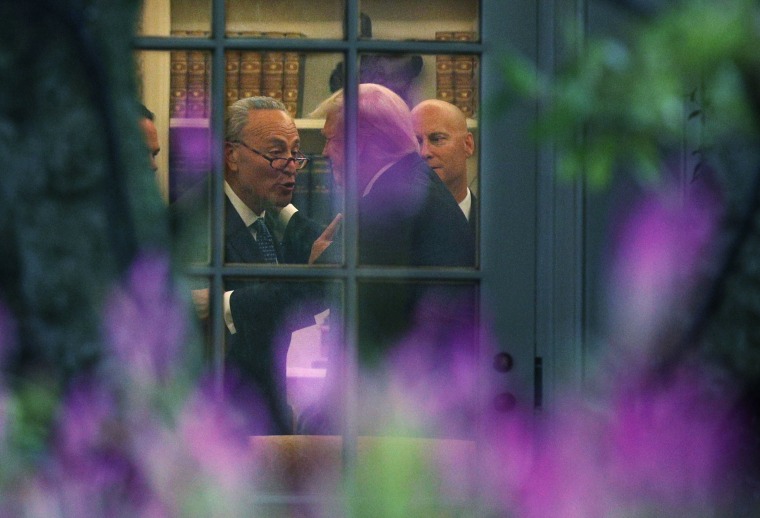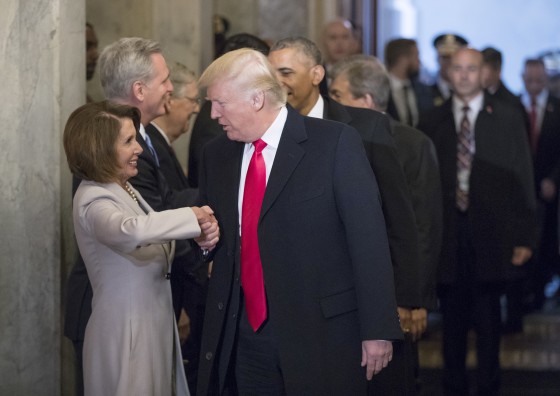WASHINGTON — Congressional Republican leaders Thursday downplayed a deal struck between President Donald Trump and Democrats a day earlier, insisting that it was nothing more than an attempt to avert political gamesmanship during a national emergency, with one hurricane cleanup underway and another storm bearing down on Florida.
But the president appears to be embracing his new negotiating partners and signaling that the bipartisanship might continue.
Trump spent much of the last 48 hours appealing to congressional leaders across the aisle, beginning with an agreement to Democratic demands to add two provisions into a disaster relief bill — short-term extensions for government spending and the debt ceiling — that will now force Republicans to take more politically treacherous votes and gives Democrats the upper hand heading into end-of-year negotiations.
In doing so, the president has bucked establishment Republicans in a way that isn't helpful to the party but could benefit his own political brand by putting together a bipartisan coalition on some issues that could help avoid the kinds of political fights that lead to a government shutdown.
The deal he struck Wednesday with Senate Minority Leader Chuck Schumer, D-N.Y., and House Minority Leader Nancy Pelosi, D-Calif., could be a one-time agreement to avoid an ugly political fight during natural disasters.
But in Trump’s public statements Thursday, he appeared energized and open to further cooperation with the opposition party.
Trump spoke to both Democratic leaders as well as Senate Majority Leader Mitch McConnell, R-Ky., and House Speaker Paul Ryan, R-Wis., on Thursday morning, according to the White House. But it was his conversation with Pelosi that spurred action.
Pelosi has urged Congress to act swiftly to pass legislation that would codify the status of immigrants in the U.S., many who arrived in the country as children, under the DACA executive order that the president ended this week. The administration has said the program will be revoked after six months and pushed the issue to Congress to solve. In the meantime, there remains uncertainty about even the immediate future of the Dreamers — those participating in the program.
At Pelosi's urging, Trump sent out a tweet assuring Dreamers that they would not be deported during the next six months while Congress attempts to legislate a solution.
“He called this morning and I said thanks for calling," Pelosi said of her phone call with the president. "What the people really need is a reassurance from you, Mr. President, that the six-month period is not a period of roundup but is just that the DACA is frozen and that these people will not be vulnerable.”
And during his conversation with Schumer, Trump expressed that he was thrilled with the positive news coverage the debt limit deal had received, a senior Democratic aide told NBC News.
“The people of the United States want to see a coming together, at least to an extent. We’re different parties, we have different thoughts, different feelings, different ideas. But I think you’re coming to see a much stronger coming together,” Trump told reporters at the White House Thursday.
Earlier in the day he said he looks forward to working with both Republicans and Democrats.
Ryan dismissed the president’s outreach to the Democrats as a move to put aside partisan differences as people recover from the recent hurricanes.
“He was interested in making sure that this was a bipartisan moment while we respond to these hurricanes, and he made that clear. And I think that’s what his motivation was,” Ryan said at a news conference.
But other Republicans were left scratching their heads. Sen. Orrin Hatch of Utah, one of Trump's first supporters in the Senate, said he was perplexed at Trump’s debt limit deal.
“How could we have a better one? He’s the ‘Art of the Deal’ guy,” Hatch said. His aide then suggested that the senator go to lunch, but Hatch continued. “Actually, I don’t know why he did that. It would be far better to work with both sides and especially with his own party.”
“He’s an interesting man,” Hatch said.
It was an unexpected development as congressional Republicans have formulated much of their agenda around passing legislation on a partisan basis. At the same news conference, Ryan dismissed bipartisan tax reform, saying that Democrats can join them if they support Republican ideas.
And not all Republicans are following the lead of their president. Seventeen GOP senators defected from the president's deal on the disaster relief package. And in the House, the measure is expected to pass with the support of mostly Democrats, with a coalition of GOP conservatives vocally opposed.
The deal put Republicans in a difficult spot. Not only do they have to vote for the debt limit increase twice in three months, but it gives Democrats negotiating power in December. The September deadlines of government funding and the debt limit have just been postponed three months. Since Republicans in the Senate need 60 votes, thus eight Democrats, to pass legislation in the Senate, Schumer has leverage.
“Chuck Schumer, whose title is minority leader, not majority leader, just made himself the most powerful man in America for the month of December,” a critical Sen. Ben Sasse, R-Neb, said on the Senate floor in opposition to the deal.

Trump spent part of the past two months attacking congressional Republicans. He blamed them for not passing a repeal of the Affordable Care Act, he questioned McConnell’s leadership abilities, and he criticized both of Arizona's senators, Jeff Flake and John McCain, at a campaign rally in their home state.
Democrats say it’s too early to tell if this is a new era of bipartisanship in Washington.
“Let's hope that this is a sign of something to come, but you never know where your shared interests might be,” Pelosi said.
Pelosi said that she and Schumer said in their meeting that they’d like to get a deal on the DREAM Act. “Both yesterday in the meeting and today he made it very clear he wants Congress to act to get this done,” Pelosi said of Trump.
In return, Pelosi said that she’d be open to border security enforcement to pair with the DREAM Act but that didn’t include building a wall along the border with Mexico.
“We have a responsibility to secure our borders,” she said.
Sen. Tim Kaine, D-Va., said that he predicted last month that "the dynamic in the Senate would be dramatically different when we came back” from recess. “But we’re only three days into it.”

